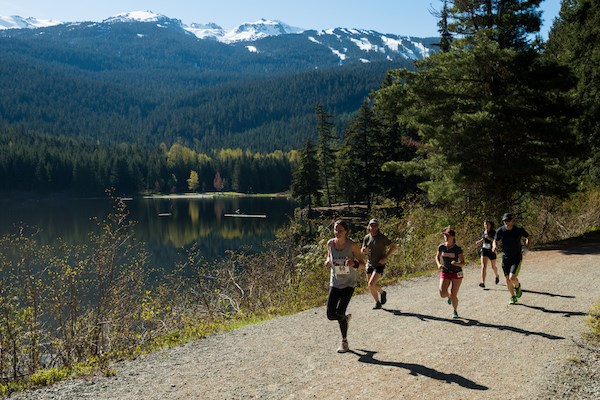Resort Municipality of Whistler (RMOW) staff came back to the council table last week with a revised fee structure for outdoor groups, a move intended to create more equitable access to municipal parks and recreational facilities.
With no policy in place addressing the use of its outdoor facilities by groups like bike day camps, and in light of the pandemic-fuelled boom in outdoor recreation creating potential conflicts among user groups, the RMOW developed a non-exclusive user permitting (NEUP) process and fee structure that will be trialled this summer. The goal is to promote fairer access and disperse users in peak periods from busy areas such as Lost Lake and Rainbow parks.
First presented to officials last month, municipal staff were asked to revise the proposed fee structure to account for large groups with 5,000 or more users, a direct response to Councillor Ralph Forsyth’s push to have Whistler Blackcomb (WB) pay its fair share for the use of the Lost Lake trails as part of the company’s popular summer DFX cross-country and downhill bike camps.
“The 5,000-plus user group dramatically underpays and I would suggest that [WB parent company] Vail Resorts makes a contribution that is commensurate with the use and impact that they have on the community,” said Forsyth at the Feb. 8 council meeting.
The proposed fee structure is based on several criteria, such as number of users, frequency of use, whether a group is commercial or non-profit, locally based or from out of town, or servicing adults or youth. In its revision, RMOW staff added several new rate categories, including three for groups above 5,000 users, and reduced the fee range within each category, “providing greater equity to each user group,” said Bob Andrea, the RMOW’s manager of village animation and events, at the March 8 council meeting.
Fees proposed for large groups now range from $1,683 for a locally-based non-profit youth camp with between 5,001 and 8,000 users, up to $18,260 for an out-of-town commercial operator with 11,001 or more adult users. For comparison, on the low end of the scale, a local non-profit youth camp with between 250 and 500 users would pay $84, while a commercial operator with the same users would pay $150, or $300 for an adult program.
“I think it’s better now because it increases the fairness and value for users,” Forsyth said at the March 8 council meeting of the revised fee structure.
When asked for comment, a representative for Whistler Blackcomb said in an email: “We look forward to this summer as the trial period, but most importantly, we are proud of our youth bike programs and their importance to our mountain community.”
Grant Lamont, owner of Whistler Trail Solutions and co-founder of the Whistler Off Road Cycling Association, said he was happy with the revisions, but noted he would like to see the funds collected go directly back to the parks and trails being charged for rather than the RMOW’s general reserve fund.
“The Lost Lake Trails, especially the Zappa Network, could use a lot more ongoing maintenance, especially since the erosion from melt and rain has increased in areas where there has been significant thinning,” he said in an email.
Both Lost Lake and Rainbow parks will see restrictions in place at certain busy times this summer, and user groups will be alerted to the closures through a new code of conduct being developed as part of NEUP. “It’s common sense-based as well,” Andrea explained. “I mean, in the peak season it can be rainy and the group still might be out there and no one’s around. No harm, no foul.”
The trial program is also intended to facilitate data collection on user demand for certain areas, which will assist RMOW staff in determining overall capacity limits. Andrea noted there is still plenty of uncertainty around the actual size of some user groups, but said staff balanced the lack of available data “with the need to provide an equitable approach for all user groups.”
The RMOW plans to review the fees following the 2022 summer season for any potential changes.
“Parks are integral to our community’s quality of life and our four-season tourism economy, so fine-tuning the financial structure to better steward these gems is really appreciated,” said Coun. Arthur De Jong.




